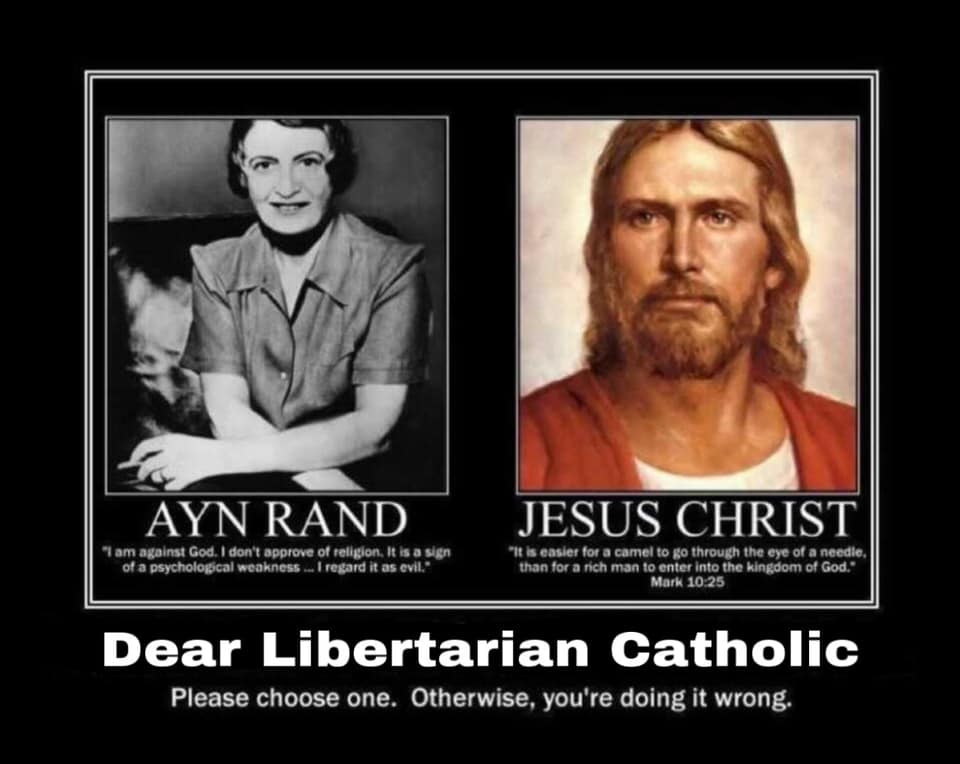Many Catholics and Christians have a false understanding of libertarianism. They think that Ayn Rand invented the philosophy or that it’s a spawn of the atheistic Enlightenment. They insist that it is a degenerate philosophy in which “doing what you want” is the highest end.

These misconceptions are understandable, especially in the age of the social bubble. But they need to be cleared up if we are to communicate in any meaningful way.
What is Libertarianism?
First, let’s define our terms. Libertarianism isn’t the cult of Ayn Rand. Libertarianism is a political philosophy that asserts that all people have Natural Rights to life, liberty, and property and that no other person (including people in the government) has the right to violate those rights. It holds that individuals should be free to pursue their own interests and goals without interference from the state or other individuals, as long as they do not infringe upon the same rights of others. Libertarians believe that the role of government should be limited to protecting individual rights, such as property rights and civil liberties, and enforcing contracts and agreements between individuals. They generally advocate for free markets, minimal taxation, and the reduction of government intervention in the economy, the society, and foreign affairs.
While many associate libertarianism with secular or atheistic perspectives, libertarianism actually has a rich Christian heritage that goes back to the Old and New Testaments and the development of Natural Rights legal theory by Christian thinkers such as St. Thomas Aquinas.
Old Testament Foundations of Libertarianism
From the very beginning, the Bible promoted faith and freedom. In Genesis, God gave Adam and Eve free will to choose to eat of the forbidden fruit or not. They chose poorly, but God wanted them to have that choice because it is what allows for divine love.
One of the earliest examples of libertarianism in the Bible is the freeing of the Jews from slavery in Egypt by Moses. The story of the Exodus emphasizes the importance of individual freedom and the rejection of coercive authority. After the Israelites were liberated from slavery, they were given the Ten Commandments, which included the commandment to respect property rights: “You shall not steal.” (Exodus 20:15)
This emphasis on property rights was reinforced by the laws established by Moses, which gave clear guidelines for property ownership and transfer. The laws also provided for restitution in cases of theft or damage to property, demonstrating the importance of protecting individual property rights.
Hundreds of years later, the people of Israel lived freely without a king or central authority. When the Jews demanded a king of Samuel, saying, “make us a king to judge us like all the nations, “Samuel was disheartened. God told Samuel, “they have not rejected thee, but they have rejected me, that I should not be king over them.” God warned them that a king would be disastrous:
He will take your sons, for his chariots. And he will take your daughters, to be cooks. And he will take your fields, and your olive yards, and give them to his servants. And he will take the tenth of your seed, and of your vineyards, and of your sheep. And ye shall be his servants. And ye shall cry out in that day because of your king which ye shall have chosen, and the Lord will not hear you in that day.
Unfortunately the Jews ignored God’s warning and demanded an earthly king anyway.
New Testament Foundations of Libertarianism
In the New Testament, Jesus emphasized voluntary charity over coercion. He taught his followers to give freely to those in need, rather than relying on the state to enforce charity through taxation. This idea of voluntary charity is central to libertarianism, which rejects coercive forms of taxation and welfare programs in favor of voluntary charitable giving.
Many claim that Jesus was a socialist because he often spoke about helping the poor, but this is a misnomer of socialism. Socialism isn’t “wanting to help people;” socialism is using the coercive force of the government to help people. Jesus never hinted that it was the role of the state or some third party to act as our moral proxy. On multiple occasions Jesus said that wealthy people should sell what they have and give to the poor but he never told people to vote for politicians to take money from other people to help the poor.
Jesus promoted individual charity, not the coercive redistribution of the state. In Luke 12, Jesus is confronted by a man who wants Him to redistribute wealth to him. But Jesus rejects the request, saying, “Man, who made me a judge or a divider over you?” and instead calls out the man for his covetousness (a sin of modern socialists everywhere).
Finally, when Our Lord was tempted by Satan in the desert, the Devil offered Him “all the kingdoms of the world and their glory”(Mt 4:8) if He would bow down and worship him. Jesus mirrored Moses and rebuked Satan, saying, “Begone, Satan: for it is written, The Lord thy God shalt thou adore, and him only shalt thou serve.”
Post-Biblical Catholic Foundations of Libertarianism
In addition to the Bible, the development of Natural Rights legal theory by Christian thinkers such as St. Thomas Aquinas and the Scholastic School of Salamanca was influential in the development of libertarian philosophy. Aquinas believed that natural law was established by God and provided a basis for individual rights, including property rights. He argued that these rights were inherent to human nature and that governments had a responsibility to protect them.
Aquinas also established the principle of limited government, citing St. Augustine. In Summa Theologiae, St. Thomas wrote:
Now human law is framed for a number of human beings, the majority of whom are not perfect in virtue. Wherefore human laws do not forbid all vices, from which the virtuous abstain, but only the more grievous vices, from which it is possible for the majority to abstain; and chiefly those that are to the hurt of others, without the prohibition of which human society could not be maintained: thus human law prohibits murder, theft and such like.(ST II-I Q. 96)
(ST II-I Q. 96)
Aquinas later elaborates, “…in human government also, those who are in authority, rightly tolerate certain evils, lest certain goods be lost, or certain greater evils be incurred: thus Augustine says (De Ordine ii, 4): “If you do away with harlots, the world will be convulsed with lust.” Hence, though unbelievers sin in their rites, they may be tolerated, either on account of some good that ensues therefrom, or because of some evil avoided.” (ST II-II Q. 10)
Conclusion
In conclusion, the Christian origins of libertarian philosophy can be traced back to the Old and New Testaments and the development of Natural Rights legal theory by Christian thinkers such as St. Thomas Aquinas. The emphasis on individual freedom, property rights, and voluntary charity are all central to the libertarian worldview and can be traced back to these Christian roots. While libertarianism may not be commonly associated with Christianity, it has a rich and deep history that continues to influence political and moral thought today.
For more on this topic, read Summa Libertas:

 The Libertarian Catholic
The Libertarian Catholic
















